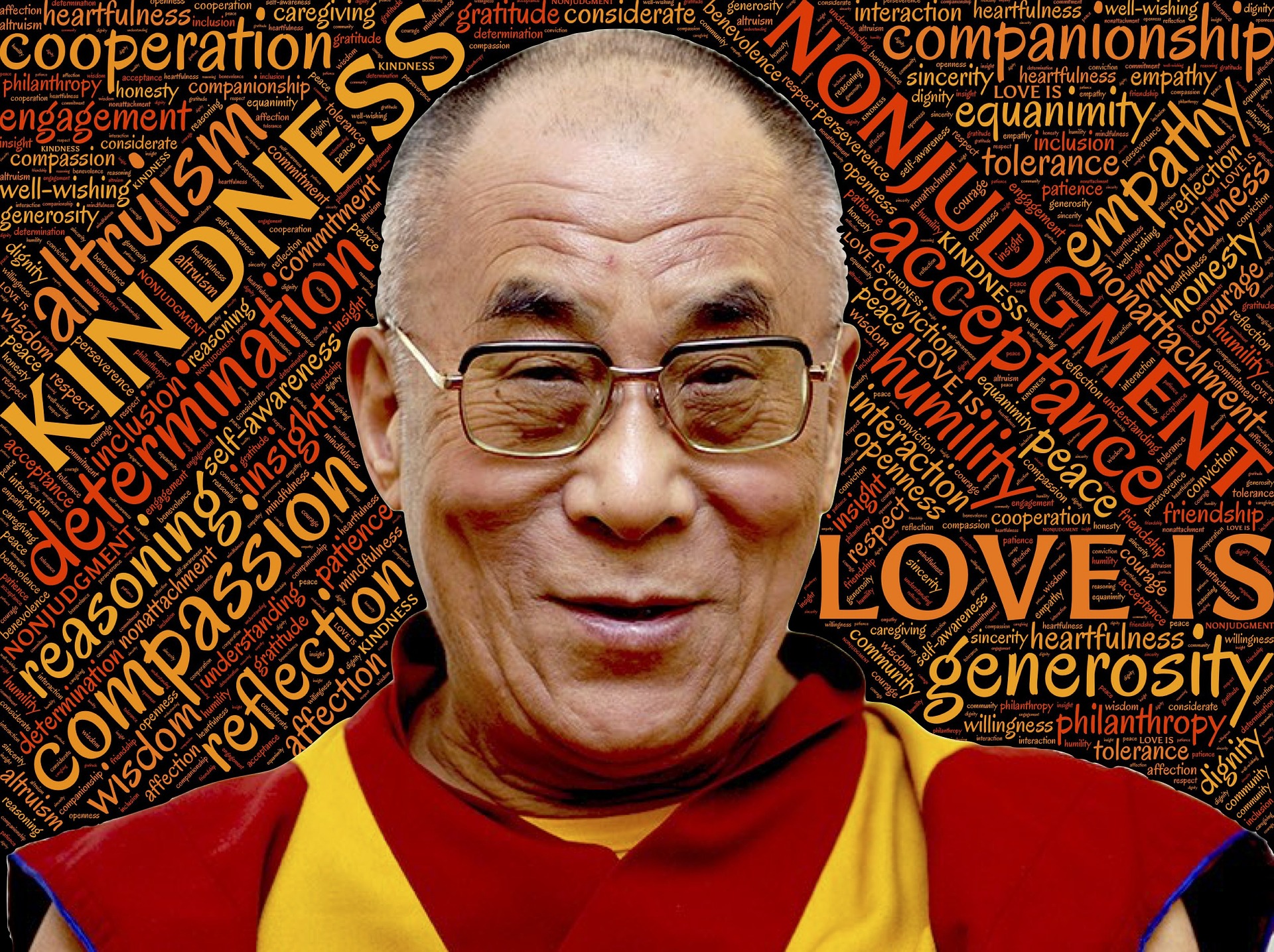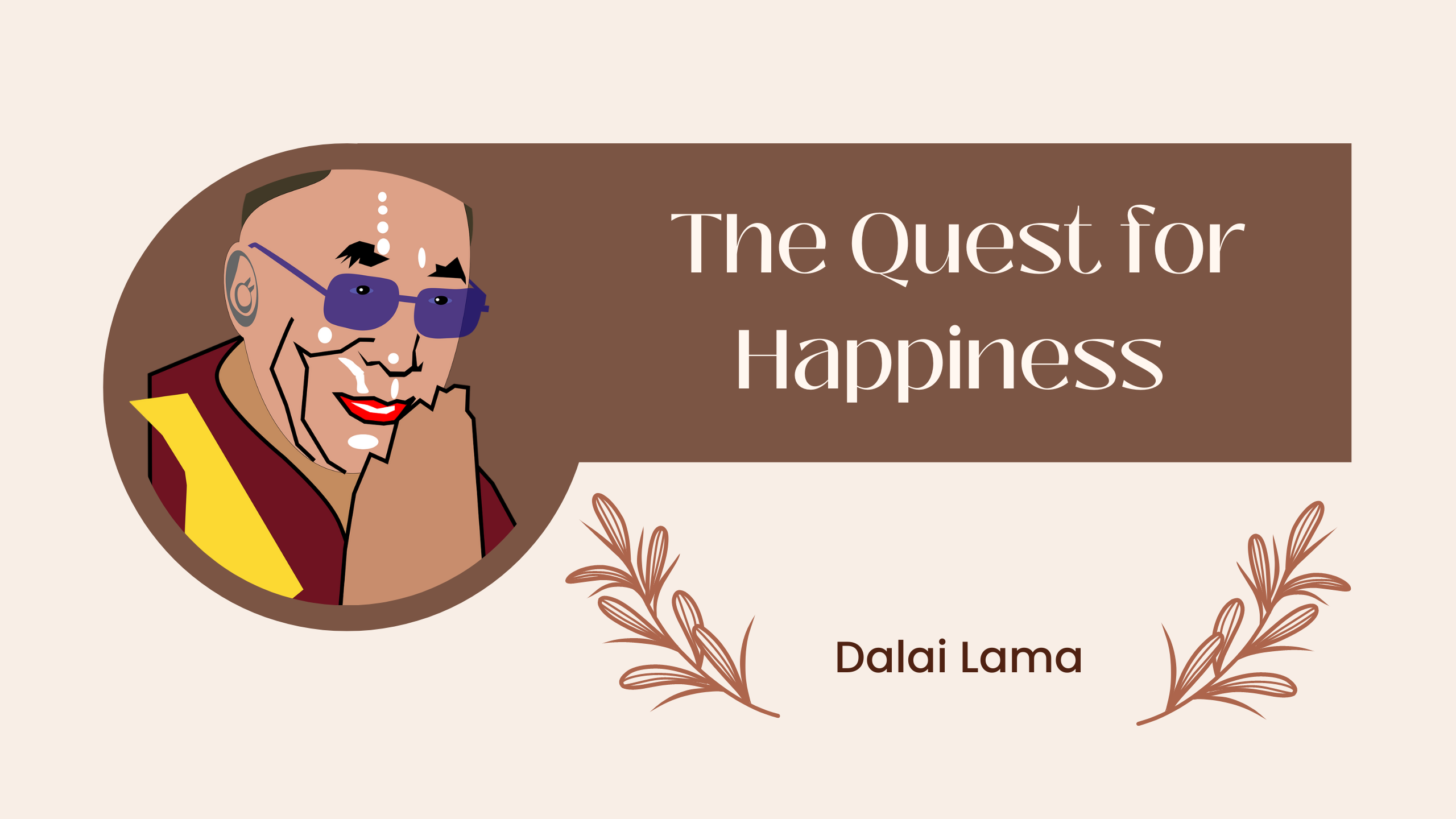Introduction
“The Quest for Happiness” is about how people can survive with hope. Its main goal is to find happiness and avoid suffering. The Dalai Lama sheds light on Wealth, which he calls prosperity, Health, and Friendship, which he calls compassion. The Dalai Lama makes it clear that his essay is based on things that have nothing to do with religion. Reading about where happiness comes from is interesting. The essay shows how important secular ethics are and how we can use them in our daily lives. These are morals that both religious and nonreligious people can follow. Here, the Dalai Lama gives suggestions and advice on how to get rid of bad feelings and help people find happiness. In this essay, the Dalai Lama explains why compassion is important and stresses how important it is to have healthy relationships, financial security, and good health all at the same time. But he says that happiness can’t really come from things in this world. Rather, the only way to get true satisfaction and ultimate happiness is to find a purpose and keep practising mindfulness.
About Dalai Lama
The 14th Dalai Lama, who is still in power, is the most famous and important Buddhist monk in the world. He is well-known around the world as a religious preacher, a Buddhist scholar, and a spiritual writer. He was born on July 6, 1935, in a small village in Takster, Amdo, north-east Tibet. His family farmed and sold horses. His Holiness became a monk when he was six years old. Lord Gautama Buddha and his ideas have a big impact on him. After Chinese troops brutally put down the Tibetan National Uprising in Lhasa in 1959, His Holiness was forced to leave the country. Since then, he has lived in McLeod Ganj, which is a suburb of Dharamsala in the northern Indian state of Himachal Pradesh. The Dalai Lama is a peaceful person. In 1989, he was given the Nobel Peace Prize for his peaceful efforts to free Tibet.
What really makes people happy?
In “The Quest for Happiness,” an essay by the Dalai Lama, he talks about what really makes people happy. He takes away from his own experience the general ideas about happiness. The Dalai Lama notices with great care that “hope,” which means thinking about something better or the idea of future happiness, helps people stay alive and, therefore, has survival value. He says that people always try to find happiness and stay away from pain. With this assumption, he lists the things that most people think make them happy, like money, health, and friends. He makes it very clear that he is talking about simple joy or happiness in the everyday sense, not ultimate religious happiness. He says that what makes a person happy is different from what makes an animal happy, which is just satisfying its senses.
Wealth as a sources of happiness
When he talks about wealth as one of the three sources of happiness, the Dalai Lama admits that material things do affect happiness for people. He says this is fair because even a hermit who lives alone in a mountain cave needs food and clothes, and so does a regular person who wants to live a decent life. He also says that money makes people happy and lets them do what they want. It also gives people choices and the freedom to choose. The Dalai Lama says that people are so worried about money that when they say “Om Mani Padme Hum,” a mantra associated with the Buddha of Compassion, they say “mani” so quickly that it sounds like the English word “money.” He agrees that having money can give you a sense of security and satisfaction, but he questions how safe money can ever be. He says that people need wealth and prosperity to meet their basic needs, which are necessary for happiness. With money, one can buy all kinds of luxuries that make life more comfortable and easier. But having these material things can’t guarantee that you will be happy forever. On the other hand, this kind of materialism may cause more stress, worry, and anxiety, which can turn into anger and even resentment.
Recent research in Psychology and the Social Sciences has shown that material possessions don’t lead to “physical flourishing,” but only to “mental flourishing.” Both fields have found that the thrill of a new purchase doesn’t last long. The Dalai Lama uses the Tibetan phrase “asar tsapo,” which means “very new,” to explain this. “Asar tsapo” means “one who always wants the newest material things,” which is a good way to describe the fickleness of today’s consumers.
The Dalai Lama says that resources and material values are at the heart of all kinds of conflicts, both small and large. He talks about his own experience with rich billionaires who are tired of their things and become unhappy and dissatisfied because their things make them lonely instead of happy or satisfied. He uses the Tibetan word “Kunga Dhondup,” which is a nickname for “money” in Tibetan. He says that the Tibetans love money, but it brings them a lot of trouble. Instead of material wealth, the Dalai Lama believes that true happiness comes from mental wealth based on love and compassion. He says that natural disasters show how easy it is to lose the security and happiness that money gives you. He says that the only thing that makes people happy, whether they are rich or poor, is how they feel inside. A poor family will be happy if they love each other, are kind to each other, and trust each other. A rich family won’t be happy if they are full of suspicion or anger. In the end, the Dalai Lama says that the mental level of a person is the most important thing for happiness. He points to recent social and scientific studies that show the mental benefits of wealth don’t last. When there isn’t a big difference between the rich and the poor in how wealth is shared, people in general are happier. This means that a person’s happiness depends on a number of situational factors that affect how they think, feel, and act about money.
Instead of material wealth, the Dalai Lama believes that true happiness comes from mental wealth based on love and compassion. He says that natural disasters show how easy it is to lose the security and happiness that money gives you. He says that the only thing that makes people happy, whether they are rich or poor, is how they feel inside. A poor family will be happy if they love each other, are kind to each other, and trust each other. A rich family won’t be happy if they are full of suspicion or anger. In the end, the Dalai Lama says that the mental level of a person is the most important thing for happiness. He points to recent social and scientific studies that show the mental benefits of wealth don’t last. When there isn’t a big difference between the rich and the poor in how wealth is shared, people in general are happier. This means that a person’s happiness depends on a number of situational factors that affect how they think, feel, and act about money.
Health as a sources of happiness
Dalai Lama says that health is the second thing that makes people happy. He agrees that physical health is important and suggests that precautions should be taken when it comes to eating, sleeping, exercising, and seeing a doctor if you get sick. But he disagrees with the idea that health should be seen as the only cause of happiness. He doesn’t agree that being healthy makes you happy. He uses the idea that someone with a strong body might not be happy, but someone with a weak body might be. Lastly, he says that health, like money, is not the best way to find happiness. Happiness depends on how we feel, what we think, what drives us, and how much we care about other people.
Friendship as a sources of happiness
Dalai Lama says that friendship is the third way to be happy. He thinks that true friendship is important for a person’s health and rejects shallow relationships that are built on purpose for money, social credit, or looks and last as long as the person is around. The Dalai Lama questions these kinds of shallow relationships and warns against trying to find happiness with friends who leave when you need them. He says that real friendship is built on trust and affection, which come from caring about and respecting other people. He talks about meeting a Christian monk when he was in Spain a long time ago. The monk lived alone behind his monastery for five years and thought about love. The Dalai Lama noticed that the monk’s eyes showed more about how he felt than his words. This example shows how having a warm heart can connect you to others even when you are by yourself. The Dalai Lama says that the only way to avoid being alone is to care about and be kind to other people from the inside.
Conclusion
In this short essay, the Dalai Lama talks about the things that make people happy: money, health, and friendship. But he comes to the conclusion that people can’t be happy forever if they follow these sources in the wrong way. He shows that these sources are useless and empty, and he shows that the inner state of mind is the key to happiness.

